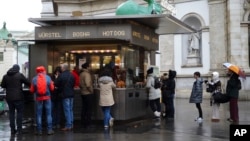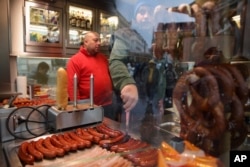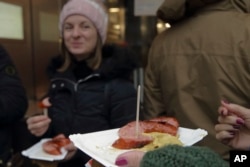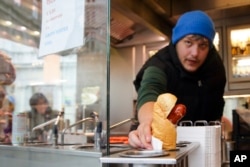A popular kind of sausage stand in Vienna, Austria has been recognized by the United Nations for its cultural value.
The street stands – called “Würstelstands” in German – are a famous part of the Austrian capital’s history. In addition to selling food, they are known for being a place where many different kinds of people can come together to eat and spend social time.
UNESCO is the United Nations’ Educational, Scientific and Cultural Organization. It seeks to recognize and help save cultural treasures and traditions around the world.
Vienna’s Würstelstands were recently added to a list of the country’s “intangible cultural heritage.” The Austrian UNESCO Commission oversees the list.
Among other things on the list are Vienna’s traditional wine establishments – called “Heurigen” – which were recognized in 2019. In addition, the city’s famous coffee house culture was honored in 2011.
The Associated Press reports the history of Würstelstands goes back generations. And they are known for much more than the tasty sausages they serve. They have been bringing people of many different backgrounds together for many years. The stands have also developed some of their own terms.
These include the “Haasse,” a special kind of boiled sausage. Another unusual stand offering is known as the “Käsekrainer” – a smoked creation filled with cheese. And there is “Oaschpfeiferl,” a spicy peperoni version, as well as the pickled “Krokodü.”
Josef Bitzinger runs the Bitzinger Würstelstand. He told the AP that sausage stands have a long history in Vienna." His stand enjoys a favorable spot, next to the city’s Albertina museum and just behind the Vienna State Opera.
“Originally it was just a bucket with hot water in which the sausages used to swim," Bitzinger said. He added that the stands began with small vehicles pulled by dogs or horses. Later, they were transported by cars or big trucks.
The tradition of Würstelstand goes back to the pre-World War I days of the Austro-Hungarian Empire. At that time, former soldiers set up movable cooking shops to make a living.
The city’s longest-serving stand in a fixed spot is Würstelstand Leo. It has been serving up sausages since 1928. The stands started to develop quickly in 1969, when the government decided to begin approving fixed stands.
Vienna’s mayor, Michael Ludwig, said he thinks the UNESCO recognition “honors the tradition, the hospitality and the diversity of our city.” He added that the stands remain a big part of the city’s culture.
Bitzinger said he and other owners had long campaigned for the UNESCO recognition. “The special thing about it is that it’s a form of gastronomy everybody can afford."
Bitzinger added, "Here the general director and, during the opera ball, a celebrity stands next to a worker and the street sweeper who just finished cleaning the street. That unites people.”
I’m Bryan Lynn.
The Associated Press reported this story. Bryan Lynn adapted the report for VOA Learning English.
_____________________________________________
Words in This Story
intangible – adj. a quality that exists but is difficult to describe or prove
pickled – adj. a process by which food is put into vinegar or salt water and stored for a long time
heritage – n. the buildings, paintings, customers, etc. that have existed for a long time and are important in a culture or society
original – adj. existing since the beginning
hospitality – n. the foods, drinks and entertainment provided by or organization or business
diversity – n. the fact that there are many different kinds of things or people included in something
gastronomy – n. the art and knowledge used in preparing and eating good food
afford – v. able to pay for something
celebrity – n. a famous person












Forum